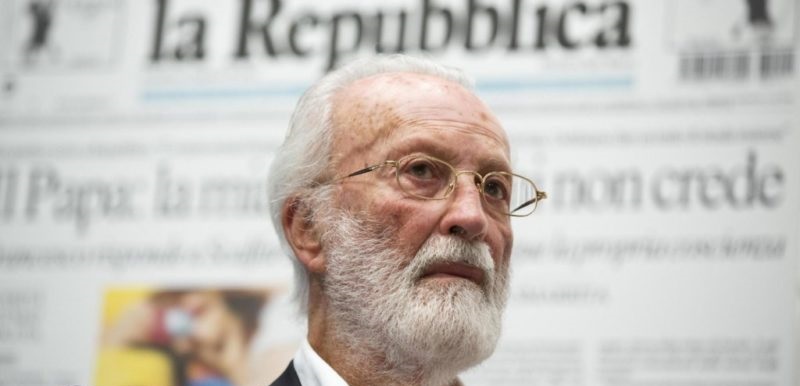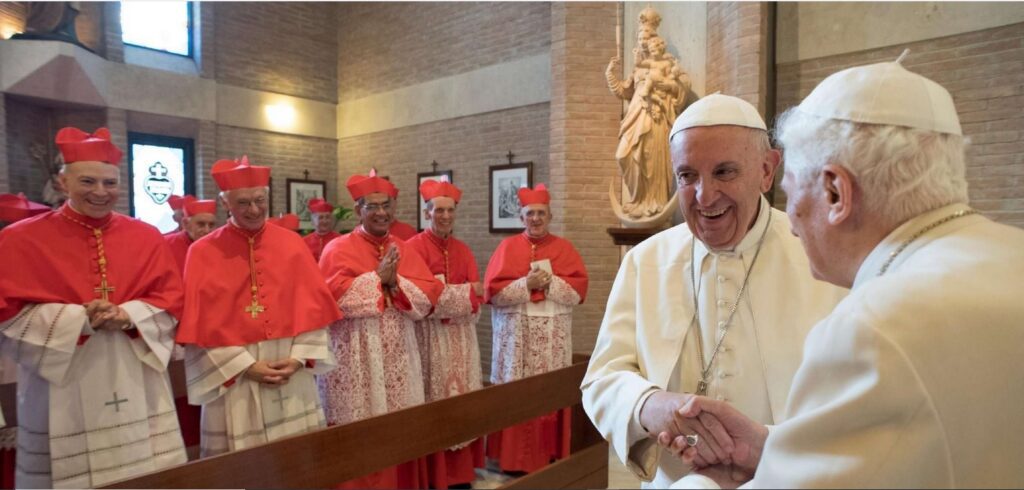(Rome) Eugenio Scalfari did it again. After he declared on November 20, why Pope Francis should be defended and Francis picked up the phone to thank the left doyen of Italian journalism, Scalfari now seemed to be reading the diarchy between Benedict and Francis in an entirely new way.
The headline is provocative, but not wrong. Since the Holy See has not seriously denied Scalfari's claims for the past seven years, his representations must be taken for willy-nilly.
On November 22nd, Scalfari himself was pleased to report that Francis had thanked him by telephone on November 21st. However, he did not report anything about the content of the phone call. On December 5th, the founder of La Repubblica made up for it from a Masonic house:
“During these hours, an intellectual understanding of great interest is confirmed in the Catholic Church - and not only. It is about the agreement between the two Popes: Pope Francis and Pope Ratzinger, who has resigned from his former functions, but is still theoretically the holder of the same, which will last as long as his life will allow him. Bergoglio and Ratzinger have been in a relationship for a long time, in a community of intentions, which involved even the most complicated phases of the pontificate, which was characterized by poisons and contradictions because of Francis' reform course. It may seem difficult for a convention of such importance to still be in full application. But the exchange continues with respect for roles. All of the most important decisions that the Popes can make can and must be agreed upon and applied jointly by both. There has never been such a situation, except in the times of Boniface, Innocent and Gregory: times that go back centuries."
The representation sounds too absurd to be true. Rather, the question seems to be what Scalfari, the unofficial mouthpiece of Pope Francis, is trying to make the world know or believe. Scalfari, it is certain that after seven years of cooperation with Francis, reproduces the statements he ascribes to the Pope in an idiosyncratic manner, but unless the Holy See announces otherwise, he cannot be accused of havin made up these statements. The unusual reading of the equally unusual situation of two popes, which is now required, also reflects the opinion of Francis in Scalfari's words.

But why does Francis, after seven years, eight months and 22 days of his pontificate, present a completely new representation with which he claims a double pontificate?
Is Benedict XVI. in quarantine?
For the time being there seems to be a plausible explanation for this: Francis knows that a growing number of Catholics are critical or even hostile to his pontificate. There is no small part of the Church that in fact no longer really recognize him as Pope. This part sees rather in Benedict XVI. the still rightful Pope. In most cases this is a personal decision that is made individually, but there are also approaches by organized groups.
Santa Marta did not hide the fact that the small trickle of 2013 has turned into a considerable stream by 2020, although for obvious reasons it is hardly recognizable to the outside world. The thesis of a Bergoglio-Ratzinger pontificate put forward by Francis through Scalfari seems to have the purpose of removing the formally central reference point, namely Benedict XVI., from his heterogeneous counter-movement. In the best case, another attempt to capture could be accepted; in the worst case, an attempt to discredit Benedict XVI. So far, Francis had stayed away from that. The attacks against Benedict XVI.and against his circle, however, came repeatedly from the closer and wider court of the Pope. Immediately after the conclave, a sheet couldn't be fit between the sayings that were passed between Francis and Benedict XVI.
That not only a sheet but entire books fit between the two popes, showed the drumbeat at the beginning, as Benedict XVI. together with Cardinal Robert Sarah, Prefect of the Congregation for Divine Worship. With the expression "From the depth of the heart " for the sacramental priesthood and Priestly Celibacy and after the Amazon Synod, generally opposed the adopting of the softening of celibacy.
Do the kingmakers want to overthrow Francis?
Is Pope Francis running out of reliable friends? The progressive forces that lifted him up and celebrated him began at some point to turn away in irritation because he could not or did not want to satisfy their hunger for radical changes, which he himself repeatedly encouraged. Since this development is fluid, it is difficult to give an exact date. However, stages can be identified based on the events and the Church in Germany that play a central role in this.

This, specifically the progressive majority of the German Bishops' Conference began in 2018 not to wait any longer for Francis, but to take the initiative. Admitting Protestant spouses to Communion was their first step. When the Congregation for the Doctrine of the Faith wanted to intervene, it was called back by Pope Francis. The German rebels prevailed.
But it seems like with power: those who have some always want more of it. So the progressive appetite for breaking up the existing and implementing innovations also grows. In this sense, the "synodal journey" was followed by the German Bishops' Conference and the progressive stronghold called Central Committee of German Catholics. And suddenly there was another ghost, the ghost of a new German schism. Francis had personally participated in the 500th anniversary celebrations of Luther's “Reformation”.
Francis made an initial allusion to the schism in 2017, but in 2020 this fear took on a new quality. It was only slightly dampened because of the Corona paralysis in public life. There are voices that speak of the fact that important progressive forces who helped Francis to the papal throne have lost patience with him and even wanted to get rid of him.
Is Francis looking for new allies?
The representation spread about Eugenio Scalfari that Francis and Benedict XVI. are one heart and one soul and want the same thing in all important questions, and not just since today, but always, sounds nice, downright idyllic, but a bit too kitschy. Reality is different, which is why the strange attempt as presented by Scalfari could hardly be successful, not on the one hand and not on the other. Santa Marta knows that too. So why the advance, when even the “no sheet of paper” thesis has hardly been advocated for some time?
The papal shadow speakers
In the past few years, an unflattering term repeatedly appeared in the analyzes to describe the current pontificate. We are talking about the "Jesuit ruse." What Scalfari presents in the name of Francis is too transparent and clumsy.
If one follows the path that Francis himself has trodden on, something far more sober, perhaps even terrifying, seems to be hiding behind the most recent Scalfari teaching post. Francis wants to inform through his Masonic friend that Benedict XVI. was placed under supervision and from now on he will no longer be able to represent his own position? So there will be a coercive harmony between the two popes because the more powerful, Francis, subjects the weaker to his control?
In August 2019 was another "shadow spokesman" of Pope Francis, the British journalist Austen Ivereigh, with the statement:
“We need the to get the circle of Benedict XVI. get under control."
Ivereigh was the spokesman for Cardinal Cormac Murphy-O'Connor, a leading member of the secret circle of Sankt Gallen and its executive organ, team Bergoglio. From the British cardinal, who died in 2017, the journalist switched directly to Francis' unofficial "press department". On December 1, four days before Scalfari's versions, the new Ivereigh-book appeared on the market, which is officially a book by Pope Francis. It received the cooperation with Scalfaris' La Repubblica for publication.

With the "control" of Benedict it did not work as well as the book by Cardinal Sarah showed. Archbishop of the Curia Georg Gänswein therefore lost his office as Prefect of the papal house, because he was supposed to ensure that Benedict distanced himself from the book project, which he did not. But a few days ago, Mario Grech, who had just been created cardinal, let the public know that Benedict XVI. was having difficulty in speaking. Gänswein denied this. If one takes some statements together, those of Ivereigh, of Cardinal Grech and of Eugenio Scalfari (on behalf of Pope Francis) and looks at the development of the past 18 months, one can understand why some draw the conclusion that Benedict XVI. has allowed himself little leeway and that which was left to him is to withdraw. Is it the aim that the voice of Benedict XVI. should no longer be heard as an independent voice?
It seems absurd to assume that Francis seriously intends to claim a double pontificate. However, it is he himself who, with this latest Scalfari move, has strengthened those who have already said that Benedict XVI. continues to be Pope. If Francis himself says this, even if only a Masonic voice in alliance with himself, why should Francis critics not, conversely, assert a papal authority of Benedict independent of Francis, when Benedict “theoretically still holds the papal functions that have continued for so long as his life will allow him, ”as long as he lives."
Did Francis consider this when he communicated his ideas to Scalfari?
Text: Giuseppe Nardi
Image: La Repubblica / Wikicommons / Vatican.va (screenshots)
Trans: Tancred vekron99@hotmail.com
AMDG


Dream all that one will. The Argentinian has the "con" in more ways that one. He has the authority and there is absolutely no way to remove him unless it be by supernatural edict.
ReplyDeleteJBQ, that is technically not correct. Benedict IX was deposed by a synod in Rome called by John Gratian. To summarize, Benedict sought to acquire a wife, and so resigned. However, he agreed to resign in conjunction with Gratian, who was elected pope for a sum of money. When Benedict was rebuffed, he sought his throne back. However, Gratian was not willing to allow such an unworthy individual to sit on the Chair of Peter, and others had already elected Sylvester II, so the Council of Satri was called by Gratian. The council decreed 1) that Benedict's resignation, obtained through simony, was invalid (thus invalidating Gratian's claim), 2) being a reprobate, Benedict was deposed, and 3) Sylvester II was recognized as the legitimate successor of Peter. The Church officially recognizes Benedict IX and Sylvester II as popes, but not Gratian. Sylvester could only be elected properly if Benedict was indeed deposed.
ReplyDelete